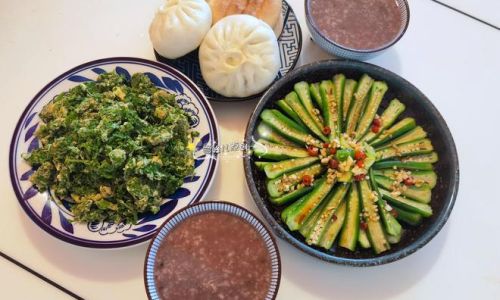Introduction
Breakfast, often referred to as the most important meal of the day, sets the tone for our overall health and well-being. For senior citizens, this meal holds even greater significance due to their unique nutritional needs and potential health challenges. As we age, our bodies undergo various physiological changes that affect our appetite, digestion, and nutrient absorption. Therefore, crafting a balanced and nutritious breakfast for elderly individuals requires careful consideration of their dietary requirements, preferences, and any medical conditions they may have. This article delves into the intricacies of how to design the perfect breakfast for senior citizens, focusing on key nutrients, meal components, and practical tips to ensure a satisfying and healthy start to their day.
Understanding Nutritional Needs of Senior Citizens
Before diving into specific breakfast ideas, it’s crucial to understand the nutritional needs of elderly individuals. As we age, our bodies tend to require fewer calories but higher amounts of certain nutrients. Here are some key considerations:

-
Calcium and Vitamin D: Bone health becomes a priority as we age, and calcium and vitamin D are essential for maintaining strong bones and teeth. Dairy products, fortified cereals, and leafy greens are excellent sources.
-
Protein: Protein supports muscle maintenance and repair, which is crucial for preventing sarcopenia (age-related muscle loss). Good sources include lean meats, eggs, dairy, tofu, and legumes.
-
Fiber: Adequate fiber intake aids in digestion and helps maintain bowel health, reducing the risk of constipation. Whole grains, fruits, vegetables, and nuts are fiber-rich foods.
-
Healthy Fats: Omega-3 fatty acids found in fish, flaxseed, and walnuts can support heart health and cognitive function. Monounsaturated and polyunsaturated fats from avocados, olive oil, and nuts are also beneficial.
-
Vitamins and Minerals: Vitamins B6, B12, and folate are vital for energy production and brain health. Potassium, magnesium, and iron are minerals that play crucial roles in various bodily functions.
-
Hydration: While not a nutrient, proper hydration is essential for overall health, especially for seniors who may be more prone to dehydration.
Components of a Balanced Breakfast for Seniors

With these nutritional needs in mind, let’s explore the components of a balanced breakfast for senior citizens:
-
Whole Grains: Start your breakfast with a serving of whole grains to provide sustained energy and fiber. Options include oatmeal, whole grain toast, or whole grain cereal. Oatmeal, in particular, is a great choice as it’s easy to digest and can be customized with various toppings to boost its nutritional profile.
-
Protein: Incorporate a lean protein source to support muscle health. This could be a boiled egg, a piece of grilled chicken, a scoop of protein powder mixed into yogurt or oatmeal, or even a small serving of cheese. For those who prefer plant-based proteins, tofu, tempeh, beans, or lentils can be incorporated.
-
Fruits and Vegetables: Add a serving of fruits or vegetables to provide vitamins, minerals, antioxidants, and fiber. Fresh or frozen fruits like berries, bananas, apples, or oranges can be enjoyed raw or blended into smoothies. Vegetables can be included in the form of a side salad, sautéed greens, or even incorporated into an omelette.
-
Dairy or Dairy Alternatives: For calcium and vitamin D, include a serving of dairy products like milk, yogurt, or cheese. For those who are lactose-intolerant or prefer plant-based options, almond milk, soy yogurt, or fortified plant-based milks can be used.
-
Healthy Fats: Don’t forget to include healthy fats in your breakfast. Avocado slices on toast, a drizzle of olive oil on a salad, or a handful of nuts can provide essential fatty acids and enhance the flavor of your meal.
-
Fluids: Ensure proper hydration by drinking water, herbal tea, or a low-sugar fruit juice alongside your breakfast. Avoid caffeinated beverages immediately upon waking as they can stimulate the stomach and lead to discomfort.

Practical Tips for Crafting a Perfect Senior Breakfast
Now that we’ve established the components of a balanced breakfast for seniors, here are some practical tips to make meal preparation easier and more enjoyable:
-
Keep It Simple: Seniors may have difficulty chewing or swallowing, so opt for softer, easier-to-digest foods. Smoothies, soups, and purees can be great options.
-
Incorporate Variety: To keep meals interesting and ensure a wide range of nutrients, mix and match different foods within the aforementioned components. For example, try different types of fruits, grains, and proteins each week.
-
Consider Texture and Consistency: Adjust the texture of foods to suit individual preferences and abilities. Cook vegetables until they’re tender, puree fruits for a smoother texture, and choose softer cheeses over harder varieties.
-
Plan Ahead: Meal prep can be a game-changer for seniors and their caregivers. Prepare breakfast components in advance, such as boiling eggs, making a batch of oatmeal, or chopping fruits and vegetables. This can save time and reduce stress.
-
Involve Seniors in Meal Planning: Engaging seniors in the process of meal planning and preparation can boost their appetite and overall well-being. Allow them to choose their favorite fruits, grains, and proteins, and involve them in simple cooking tasks.

-
Monitor for Allergies and Intolerances: Be mindful of any food allergies or intolerances. Common allergens for seniors include gluten, dairy, and certain fruits. Adjust meals accordingly to avoid discomfort.
-
Encourage Social Eating: Eating with others can enhance the pleasure of meals and promote better nutrition. If possible, arrange for seniors to eat with family members or in a community setting.
Conclusion
Crafting the perfect breakfast for senior citizens is a delicate balance of meeting nutritional needs, accommodating physical limitations, and ensuring meal enjoyment. By incorporating whole grains, lean proteins, fruits and vegetables, dairy or dairy alternatives, and healthy fats, while keeping texture, consistency, and variety in mind, you can create satisfying and nutritious breakfasts that support the overall health and well-being of elderly individuals. With careful planning, involvement, and a bit of creativity, breakfast can be a delightful and nourishing experience for seniors, setting the stage for a healthy and fulfilling day.






0 comments